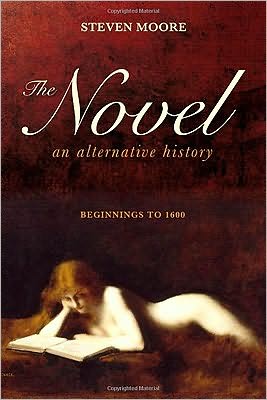Novels really start when an important technology (the printing press) allows novelists to respond to one another.
Steven Moore’s The Novel: An Alternative History: Beginnings to 1600 is a very alternative history that points even more than most histories of the novel to the question of what defines the genre. But it answers that question with less satisfaction: a novel is any prose work of some length that is what we would now call fiction. But the idea of fiction / nonfiction weren’t particularly well established until the late eighteenth century, as discussed in some of those conventional histories, like The Rise Of The Novel: Studies In Defoe, Richardson And Fielding and Institutions of the English Novel: From Defoe to Scott.
Without that epistemological distinction, critics lack the intellectual scaffolding necessary to really talk about fiction: you have a muddle of stuff that people haven’t really figured out how to deal with. In The Disappearance of God, J. Hillis Miller puts it differently: “The change from traditional literature to a modern genre like the novel can be defined as a moving of once objective worlds of myth and romance into the subjective consciousness of man,” but he’s getting at a similar idea: the “objective worlds of myth” turn out not to be as “objective” as they appear, and the “subjective consciousness of man” reevaluates those worlds of myth. We get at distinctions between what’s true and what’s false based on our ability to recognize our own subjective position, which the novel helps us do.
Moore discusses these issues, of course: he notes the standard history I’m espousing and his reasons for doubting it:
And today our best novelists follow in this great tradition [from Defoe, Swift, and Richardson to the 19th Century realists through Joyce and Faulkner to the present]: that is, realistic narratives driven by strong plot and peopled by well-rounded characters struggling with serious ethical issues, conveyed in language anybody can understand.
Wrong. The novel has been around since at least the 4th century BCE […] and flourished in the Mediterranean area until the coming of the Christian Dark Ages.
That’s on page three. I’ve responded to the philosophical and intellectual aspects of what I think problematic, but there’s another issue: Moore’s argument ignores the technological history that enabled the novel to occur. I’ll return to my first paragraph.
Without the printing press, it’s wrong-headed to speak of novels. They couldn’t be sufficiently read, distributed, and disseminated, to enable the “speaking to each other” that I think of in fiction. There wasn’t a “creativity revolution” along the lines of the runaway Industrial Revolution of the eighteenth century (see, for example, Joel Mokyr’s The Enlightened Economy, which I discuss at the link). Books didn’t react enough to other books; that’s part of what the novel got going, and this aspect was enabled by the Industrial Revolution and the press. The two are fundamentally linked.
Some works that we would now classify as fiction definitely were written or compiled, as Moore rightly points out, but they didn’t gain the epistemological distinctions that we grant novels until much later, and novels evolved with a mass reading public that could only occur when novels were mass-produced—produced in numbers that allowed them to be read and responded to by other writers. Claiming that early quasi-fiction forms are novels is like saying that a play and a TV show are the same thing because both rely on visual representations of actors who are pretending to be someone else. In some respects, that’s true, but it still misses how form changes function. It misses the insights of Marshall McLuhan.
He almost gets to this issue:
Sorting through the various ancient writings that have come down to us on cuneiform tablets, papyri, scrolls, and ostraca (potsherds or limestone flakes), it is not difficult to find prototypes for literary fiction and what would eventually be called the novel. What’s difficult is sorting prose from poetry, and fiction from mythology and theology.
But the problem of sorting deserves more attention. Until it can be discussed with greater depth, it misses essential features of the genre. Accounts of the novel need to take two major issues into their reading: a technological one and an intellectual one. The technological one, as mentioned, is the invention and improvement of the printing press, without which the sheer labor necessary to produce copies of novels would have prevented many writers from working at all; you can read more about this in Elizabeth L. Eisenstein’s The Printing Press as an Agent of Change The second is the growth of subjectivity and the acknowledgment of subjectivity in fiction, as also discussed above. Without those technological and the intellectual facets, I don’t think you really have novels, at least in the way they’re conceived of in contemporary times.
The other thing I’d like to note is that Moore is doing more a taxonomy than a history: it has brief sections on more than 200 books with relatively little analysis of each book. This lessens the depth of his book and makes it more tedious as we go from culture to culture without a great deal of discussion about what common items link novel to novel. But that’s part of the problem: proto-novels weren’t linked because their authors didn’t know of one another or of what made fiction fiction and nonfiction nonfiction. Moore is left with this basic shape for The Novel: An Alternative History by his material; in short, form undercuts argument. Too bad, because it’s an argument worth paying attention to if for no other reason than its novelty.
